“Critical Race Theory,” also known as CRT, is a phrase that has become shorthand for just about any classroom instruction on racism, past or present. But what is this fight really about? What are these anti-CRT bills aiming to accomplish, and how will they affect schooling in the US? Amna Khalid discusses the rise of anti-CRT bills with Harvard Law Professor Randall Kennedy; Acadia University Professor Jeffrey Sachs; and former president of the ACLU, Professor Emerita Nadine Strossen of New York Law School.
SPEAKER 1: Critical race theory is teaching that white people are bad.
SPEAKER 2: We’re demonizing white people for being born.
SPEAKER 1: This theory was never meant to be brought into grade schools, high schools at all. It’s actually taught in the collegiate atmosphere.
SPEAKER 2: These are systemic things. Ignoring it perpetuates the problem. By acknowledging it, we can find solutions and we can address the problems and the inequality that exists in our country.
SPEAKER 3: You gonna deliberately teach kids: “This white kid right here got it better than you because he’s white”? You gonna purposely tell a white kid, “Oh, well, black people were all down and suppressed”? How do I have two medical degrees and I’m sitting here oppressed? [cheers] How did I get that? [cheers]
AMNA KHALID: Most parents of young schoolchildren are familiar with the stories--third graders in California are given an assignment: rank yourselves by power and privilege based on your racial identity. Parents in North Carolina say middle schoolers are forced to apologize in class to their peers for their privilege. In an elementary school in Manhattan, children are sorted by race for mandatory training. In some Buffalo schools, students are taught that all white people are guilty of implicit racial bias. Sometime towards the end of last year, parents and politicians freaked out, mostly conservatives, who see all this as a kind of liberal indoctrination of our youth. In at least 26 states around the country, Republican legislators have introduced what are now called anti-CRT bills. CRT stands for critical race theory, a phrase that has become shorthand for just about any classroom instruction on racism, past or present. But what is this fight really about? What are these bills aiming to accomplish and how will they affect schooling in the US? I spoke to three experts about the rise of anti-CRT bills. First is Harvard Law Professor Randall Kennedy, who says that although CRT was coined decades ago as a purely legal, academic term, it has now all but lost its original meaning.
RANDALL KENNEDY: Now, if I'm in a seminar at my law school and we're talking about critical race theory, I'm thinking about a community of people, a community of thought that has its origins in the 1980s, that believes that liberal legalism was inadequate to get us to a state of racial justice. They’re people who believe that mere anti-discrimination would not suffice to redress the terrible injuries of racial oppression. Something much more activist, something much more deep-seated, had to be done to get us to where we needed to go. On the other hand, if we're just talking about on the street, if we're talking about television, if we're talking about radio today, for many people, especially for its most vocal critics, critical race theory is anything that they don't like that has to do with race. It's an open category and it's more of a slogan than anything else.
KHALID: Let's move a little bit away from its origins and from the academic context and think about what it's come to mean today, particularly when we're referring to these anti-CRT bills. We've seen a rise in bills that have been drafted across the country, primarily in Republican-dominated states, where there is an attempt to banish, if you will, what they call teaching of critical race theory, particularly at the K-12 level. Now, as someone who is a scholar, a legal scholar, can powers that be do that? Is it legally sanctioned to stipulate what K-12 curriculum should be or is it in contravention of the First Amendment?
KENNEDY: It can be done. It's a well-known tenet of American practice that public primary and secondary schooling is largely under the control of local political forces. It's deemed to be perfectly proper for primary and secondary schools, for instance, to inculcate patriotism. You know, that's viewed as uncontroversial. Of course you're going to inculcate patriotism. Of course you're going to inculcate various attitudes that the ascendant political forces in your jurisdiction want to be taught in schools and nourished and lauded. We want our youngsters to know about the Founding Fathers and the greatness of American democracy, et cetera, et cetera. Well, if you can do all of that, I mean, that's inculcation. This is another type of inculcation, or it's saying what we don't want taught. Well, you can do that. You can, for instance, have a school system in which you say, “We're going to banish the teaching of racist ideas.” And in fact, that's what some of these people, you know, are saying right now. They're terming critical race theory itself as a type of racism. And they're saying, “We don't want that taught.” Can that be done? Yeah, that can largely be done at the K-12 level. Yes.
KHALID: There's nothing that prevents that kind of move from being undertaken.
KENNEDY: That's right. It’s a political question. Basically from kindergarten to 12th grade, what you're taught in school is largely under the control of the local school board, the city school board, the county school board. It's a matter of local democratic politics. And so, it's a political struggle.
KHALID: OK, so, Randy, now I'm going to ask you to take off your legal scholar hat and put on your hat of an educator who is concerned with how we train our students to think. So with that hat on, I'd like you to tell us, are you in support of anti-CRT legislation?
KENNEDY: I'm appalled by it. In my view, what's going on is the latest iteration of a phenomenon that we have seen over and over and over again. In my view, this is analogous to what happened in the 1950s: the panic over communism, the panic over socialism. You'll note that those two words often find themselves in close proximity to critical race theory. People say, you know, “Critical race theory is Marxism. Critical race theory is socialism.” There's a long history of stigmatizing ideas that are dissident, especially ideas that are critical of the status quo. There's a long history of stigmatizing such ideas as communistic or socialistic or Marxist. And that's what's going on today. The courts, I don't think, are going to be our salvation. I think our salvation is going to be public opinion. And you asked me, “Well, you know, what should people be thinking?” People should be thinking, “How do I want my children to be trained?” I would think that people would want children to be critical thinkers, would want children to be introduced to all sorts of ideas, including ideas that they don't like, trained in such a way that children can have a critical, skeptical stance toward a wide range of ideas. That, it seems to me, is what we should want in our public schools. And we cannot have that if certain ideas are banished. Let the teachers introduce things that are called critical race theory and let's talk about it: “What do you think of this? How should this be assessed?” The art of assessment is what we should be inculcating in our history and in our social studies and in our civics classes. And we can't do that if we are in a panic and banish ideas that we think we don't like.
KHALID: According to Randall Kennedy, critical race theory in 2021 means something very different from what its original proponents intended. Nowadays, the term is loaded. It is political. It means everything and says almost nothing about what is actually being taught in schools. But it's the term that we're stuck with for the time being. The more immediate question then becomes, what are these anti-CRT bills trying to achieve? Jeffrey Sachs teaches Middle Eastern politics at Acadia University in Canada and has been closely following the various legislation.
JEFFREY SACHS: These efforts focus their attention on preventing K-12, and in some cases, public universities and colleges from engaging in certain kinds of speech in the classroom, assigning certain kinds of materials, and also, in some instances, preventing the kinds of trainings that schools can require teachers or staff to undergo as part of their jobs. And really, the long and short of it is that this is an attempt to prevent teachers from being trained in or discussing certain ideas that conservatives really hate.
KHALID: And what are those ideas?
SACHS: The list fluctuates. They tend to focus on things like the idea that one race or sex is inherently superior or inferior to another race or sex, or the idea that somebody, by virtue of their race or sex, is guilty or should feel shame on that basis. I don't think there are many people out there--I certainly, I hope not--who think that a person should feel shame or guilt on account of their race or sex. So, the ideas that are being targeted for censorship by these laws, many of them, when they're presented, they sound like a reasonable law. But when you kind of really drill down into how these laws are being written, you discover very quickly that they're far more sweeping and in some cases, far more sloppily drafted than probably they should be. And they would inevitably sweep up and censor all kinds of speech or classroom content that we want to have included, that we want to have protected. This is really a case where the politics of the issue, I think, are so powerful and the momentum is so great that legislators aren't really thinking clearly or if they are thinking clearly, they have malign intent because the result is laws that really are going to do a lot of damage to both K-12 and higher ed.
KHALID: It may be constitutional in the K-12 context, yet that doesn't make it okay, and it doesn't mean that it doesn't come with a set of both anticipated and unanticipated consequences. There's nothing wrong in saying that teaching divisive concepts, which say things like, “If you're from a particular race you’re inherently superior or inferior,” is wrong, and we don't want that happening in our schools. Yet, the issue becomes very nebulous when we begin to think about definitions, what constitutes a divisive concept becomes contentious.
SACHS: So, a good example is the law recently passed in Tennessee, which reads that a public school authority or public charter school shall not include or promote the following concepts as part of a course of instruction, and also that they may not use any supplemental instructional materials that include or promote the following concepts. And then it lists an array of concepts similar to the ones I described earlier. Now, the problem here is that there are all kinds of sound pedagogical reasons why a teacher might wish to include a concept in a course, even a very controversial concept. So an example might be that the teacher wishes to include a primary source written by an author who lived 100, 200, 300 years ago, at a time when certain kinds of divisive concepts were common currency. It might be useful, for instance, for the purposes of discussing historic discrimination or present-day discrimination for a teacher to cite a document that contains a divisive concept. If you pass a law, as Tennessee has, saying that teachers may not include such material in the course, then you are robbing students of their ability to confront and think intelligently about these ideas--ideas that they're bound to encounter at some point in their everyday lives. It should be the jobs of teachers to introduce concepts, no matter how divisive, so long as they do so in a responsible, neutral, and objective way. These laws, in many cases, do not draw that distinction. Instead, they ban any inclusion of these ideas. Tennessee’s is a good example. It bans the mere inclusion of these ideas, even if included objectively and discussed neutrally. That kind of sloppy drafting, if indeed it is sloppy and not intentional, is, I think, a real ticking time bomb.
KHALID: The irony is that those who are pushing these laws are the ones who, until very recently, supported a president who was making precisely the kinds of speeches where certain groups were being seen as inferior and which would be very much part of your civics education if you were trying to engage in an educational discussion about democracy in America.
SACHS: Absolutely. I mean, under this law, there's many Trump speeches that I'm sure would be ineligible for inclusion in a Tennessee classroom. Setting aside my own opinions about Donald Trump, I think that there is very valid pedagogical reasons for why a civics teacher might want to include a speech by the president of the United States. It's just a no brainer to me. Whether they mean to or not--and I always try to give legislators the benefit of the doubt, but whether they mean to or not, this law, which is currently on the books in Tennessee, would forbid the inclusion of a speech by the president. That seems to me to be insane.
KHALID: But hang on, Jeff. People in favor of these bills often point out that teaching at the K-12 level is already highly regulated. Take creationism. You can't make that part of the science curriculum. And for the most part, people are okay with that. So what's wrong with banning CRT then, if that's something we want to keep out of the classroom?
SACHS: There's a good reason why this is not a good analogy, because the fact of the matter is we do not ban creationism from public schools, right? We ban the promotion of creationism. We ban, under the Establishment Clause--jurisprudence--Teachers may not promote the idea that the earth or the cosmos was created by a deity. However, teachers are free to discuss that idea. And in fact, they have to if they're going to discuss things like Greek and Roman mythology or Dante's Divine Comedy. So there has to be room in our law and in our jurisprudence to allow people to discuss the idea of creationism so long as they do so in a neutral and objective way. We should extend that same basic courtesy and framework to critical race theory and its attendant ideas. So, people should be allowed in the classroom to discuss the idea that black people are inherently superior or inferior to white people, if only for the reason that that idea pops up in important documents and important conversations throughout history and in the present day. A teacher would be failing in his or her duty if they did not prepare students for the eventuality that they will encounter that idea outside the classroom. People should also be able to discuss the concepts of critical race theory without saying critical race theory is the truth.
KHALID: Jeffrey, I'm going to actually move the conversation to discuss a different context, which might help elucidate some of the issues that we would face in the US. And it's one that I feel you're well-equipped to comment on. So, I come from Pakistan. And Pakistan is a very different society, one that has been looked upon in the US as a society that is backwards. And one of the key issues is we have blasphemy laws, which prevent the discussion of anything that insults Muhammad. Now, what constitutes a blasphemy is the issue over here. And in colleges and universities, I remember growing up not being able to ask genuinely inquisitive questions because they were being shut down because they were seen as blasphemous. So, for instance, Mohammad does X, Y, and Z and a single question like, “Well, why was this the best option?” or “Why did he choose to do this?” would be met with such irate censure from the teacher, who clearly did not want to go there for reasons that this could have implications should this be reported outside of class. And I feel like the US discussion about bills about CRT would benefit immensely--we could elucidate the ill effects of these if we just look a little beyond our shores to see what's going on in other countries. You study the Middle East.
SACHS: That's such a fascinating comparison. And I think it really does kind of cast a bit of relief, what you're talking about. There's a famous case from the early 1990s in Egypt where something similar to what you're describing happened, where a university professor--of course, academic freedom is severely circumscribed in Egypt then and now. And in the early 1990s, this university professor described the Koran as a historical creation, that it reflected the events of its time and is not necessarily a universal and eternal document the way kind of orthodox Islamic theology presents it to be. For this, for engaging and considering this kind of critical view of the Koran, he was fired. He was prosecuted. He was declared by the courts to be an apostate, and his marriage to his wife, who, at least according to the courts, was still a Muslim in good standing, was annulled, and the two of them had to actually flee the country. Now, that's a very famous and thankfully, at least, a very extreme example, even in the context of Egypt, where these issues can be so sensitive. But it definitely highlights the idea that the moment you fail to draw a distinction between the discussion of an idea and its promotion, then you are robbing teachers and students of the opportunity to confront and critically consider certain ideas. So, while I don't think we in the United States or Canada or wherever face a similar kind of punishment if we run afoul of these anti-CRT laws, the threat is there and the self-censorship will be too. So, there we will definitely see in America teachers (and frankly, in many cases professors as well, because academic freedom is only as powerful under the law as the people who enforce it), at all levels, we will see a kind of self-censorship and a kind of terror in many cases of running afoul of these texts.
KHALID: As Jeffrey Sachs suggests, many of these bills do not make a distinction between explaining an idea and endorsing it. But that's just one problem with how these bills are drafted. Nadine Strossen is professor emerita at New York Law School and former president of the ACLU. She takes issue with the way these bills invoke the concept of divisiveness.
NADINE STROSSEN: The concept of divisiveness is being bandied about as if it is inherently negative. And that is very dangerous because divisiveness applies to ideas that people disagree with, right? Any time somebody says something controversial or provocative or unpopular, one of the stigmatizing accusations is, “Oh, you're engaging in divisiveness.” Or if you say something critical of government policy or, heaven forbid, of school policy--“Oh, don't be so divisive.” Well, what's the opposite of divisiveness? It's uniformity. It's homogeneity. It's conformity. And that's the opposite of the critical thinking toward which I think we should be striving if we are to educate our young citizens. And interestingly enough, in the Supreme Court's most recent student free speech case from the summer of 2021, the Mahanoy case, the Supreme Court actually said that the school itself has an interest in making sure that students have the right to engage in unpopular expression. That could be, in other words, divisive expression. And not only that the students have that right, but the school even has a duty to teach students the importance of exercising and defending unpopular speech in particular. And that would certainly apply to divisive speech.
Now, I also want to go back to the 1969 Tinker case where Mary Beth Tinker and a number of other students wore black armbands to school to protest the Vietnam War in the early 1960s, at a time when the war was still very popular, when critics of the war were very unpopular, were assumed to be traitors to the United States and unpatriotic. And it was very upsetting expression because many parents and siblings of these school kids and teachers were off fighting and dying in Vietnam. A recent alum of the school had recently been killed in Vietnam. So this was very divisive emotionally as well as politically. And the school cited those concerns in saying, “Well, that's disruption and we can't have that in the public schools.” And the Supreme Court said, “No, no, no, no, no. Freedom for ideas, especially about matters of public affairs”--That's true for CRT, deals with matters of public affairs--“is critically important. If we were to say that the mere fact that speech can be divisive or upsetting, either personally or politically, that that's not a basis for allowing it to be protected, then we are teaching the wrong lessons about citizenship to these future voters and future leaders of our country.”
KHALID: I'm actually really glad that you brought that up, because I think one of the hallmarks of democracy is precisely to not just allow for or tolerate, but to actually foster dissent, to create spaces where dissent is possible. As an educator, what I see happening with these bills is that they reek of an authoritarianism which is trying to produce the kind of conformity that fundamentally hollows out democratic institutions. And it's terrifying. When the public school system is destroyed is when you begin to see the downfall of a society. And it troubles me deeply.
STROSSEN: You know, without free thinking and critically thinking and debating and discussing citizens, our democracy is going to crumble because it depends on we, the people, to wield our sovereign power. We can't do that in an informed, meaningful way unless we have nurtured and respected dissent.
KHALID: I want to end with Professor Randall Kennedy, who believes that there is a direct line between laws that stifle open inquiry and the very health of our civic society.
KENNEDY: The quality of our education is intimately tied up with the quality of our democracy. All of the leading theorists of democracy have talked about the importance of public education. They are bound up with one another. K-12 is the foundation of our educational system. What happens in K-12, tremendously important. In a democracy, if the people rule, it's very important for the people to make decisions about our health, about the use of military force, about all of the things that are significant. Well, if you have a lot of ignorance out there, if you have, out there, people who have not been trained to make wise assessments, if you have, out there, masses of people who really don't have the ability to separate disinformation from good, useful information, the fanciful from the realistic, well, a society that's governed by a badly educated populace is a society on its way down, which is why, you know, the struggle over the schools is so important.
KHALID: As a mother of two young boys, I, too, am deeply invested in how racism is addressed in our schools. I definitely don't want my kids coming home and saying things like, “Mama, we were told today that white people are oppressing us.” That's not what I would consider an education. But if legislation is not the answer, and I firmly believe that it's not, then what can parents do to protest indoctrination in schools? We'd love to hear your thoughts on this issue. You can leave a written comment on BooksmartStudios.org or email a voice memo to banished@booksmartstudios.org.
If you like what you heard today and want more exclusive content, including access to my extended conversation with Nadine Strossen and an exclusive discussion with Greg Lukianoff, the president and CEO of FIRE and coauthor of Coddling of the American Mind, please consider becoming a paying subscriber to Booksmart Studios. Subscribers get transcripts, extended interviews, and bonus segments. Also, check out my sister podcasts by Booksmart Studios: John McWhorter's Lexicon Valley and Bob Garfield's Bully Pulpit. Please comment and help us spread the word. The success of Booksmart and the impact of our work depends as much on you as on us.
Banished is produced by Matthew Schwartz and Mike Vuolo. And as always, I am Amna Khalid. Cheerio.







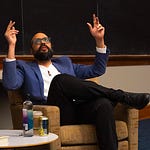
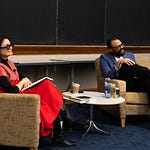
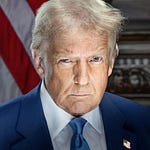

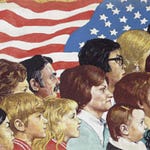

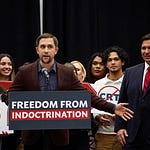
Share this post